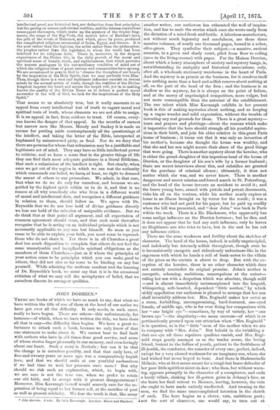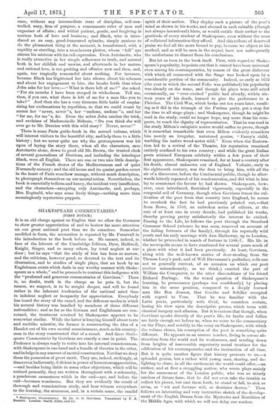JOHN DORRIEN.*
THERE are books of which we have so much to say, that when we have written the title of one of them at the head of our notice we have got over all the difficulty. It only needs, in such cases, really to have begun. There are others—this unfortunately, for instance—of which, when we have written the title, we have done all that is easy—the difficulty then begins. We have a great re- luctance to attack such a book, because we only know of that one statement to make about it. We cannot bear to find fault with authors who have in old times done good service, and some of whose stories linger pleasantly in our memory, and even lovingly about our heart. Such a story is Natludie ; but can it be that the change is in ourselves possibly, and that that early love, of five-and-twenty years or more ago, was a comparatively boyish love, and that we should smile at our youthful enchantress if we had time to seek her presence once more? But why should we • risk such an explanation, which, to begin with, we are sure is not the true one, when we prefer to retain our old faith, and to accept with it present disappointment? Moreover, Miss Kavanagh herself would scarcely care for the re- putation of being equal to her former self, at the sacrifice of past as well as present celebrity. We fear the truth is that, like many • John DO7r it n 8 vole. By Julia Kavanagh. London : Hurst and Blackett. another writer, our authoress has exhausted the well of inspira- tion, and has to make the stories which once she wrote easily from the dictation of a mind fresh and fertile. A laborious manufacture, not without much ingenuity and carefulness, are these three massive volumes, of nearly one thousand pages, bound in a sober, olive-green. They symbolise their subject,—a massive, ancient mansion, in a green and shady court, piled from floor to ceiling (save in the living-rooms) with paper. For the Maison Dorrien, about which a heavy atmosphere of anxiety and mystery hangs, is, notwithstanding its antiquity and historical assoclations, only, after all, a wholesale stationery warehouse in the heart of Paris. And the mystery is as prosaic as the business, for it resolves itself into nothing more than a hard and selfish reserve about nothing at all, on the part of the head of the firm ; and the business is as shallow as the mystery, for it is always on the point of failure, and at the mercy of unprincipled competitors, more vulgar, but not more contemptible than the autocrat of the establishment. The one talent which Miss Kavanagh exhibits in her present book is this of making mysteries about nothing, and so keeping up a vague wonder and mild expectation, without the trouble of inventing any real grounds for them. There is a great mystery-- tears and prayers and plottings—about the reasons which make it imperative that the hero should strangle all his youthful aspira- tions in their birth, and join his elder relative in this great Paris house of business ; it turns out that it was only an invention of his mother's, because she thought the house was wealthy, and that she and her son might secure their share of the good things that were going. There is another mystery about the heroine, who is either the grand-daughter of this imperious head of the house of Dorrien, or the daughter of his son's wife by a former husband ; there are secret interviews about this, and subsidies are granted for the purchase of criminal silence ; ultimately, it does not matter which she was, and we never know. There is another dangerous and secret mission and forced march to St. Petersburg, and the head of the house invents an accident to avoid it ; and the brave young hero, armed with pistols and potent documents, risks his all on the venture, while his mother nearly expires at home in an illness brought on by terror for the result ; it was a customer who had not paid for his paper, but he paid up readily when the bill was presented, and "dear John" was back in Paris within the week. There is a Mr. Blackmore, who apparently has some malign influence on the Dorrien fortunes ; but he dies, and it does not appear that he had any such influence, only he leaves an illegitimate son who tries to have, but in the end he has not any influence either.
There are the same weakness and futility about the sketches of character. The head of the house, indeed, is mildly unprincipled, and indolently but intensely selfish throughout, though even he is inconsistently energetic and ridiculously unbusiness-like in the eagerness with which he hands a roll of bank-notes to the villain of the piece as the curtain is about to drop. But with the ex- ception of the heroine, there is no other character which does not entirely contradict its original promise. John's mother is energetic, scheming; ambitious, unscrupulous at the outset— ruling her son with a despotism which was absolute, though mild —and is almost immediately metamorphosed into the languid, whimpering, soft-hearted, dependent "little mother," by which sickly appellation our authoress is pleased to arrange that her son shall invariably address her. Mrs. Reginald makes her entree as a stern, forbidding, uncompromising, hard-featured, one-eyed female, of middle age, who is for ever fixing her companions with her "one bright eye "—sometimes, by way of variety, her "one brown eye "—the singularity—we mean oneness—of which is as pertinaciously pressed upon our attention when "Mrs. Reginald" is in question, as is the "little "-ness of the mother when we are in company with "Mrs. John." But behold in the twinkling o that one eye all these repulsive qualities vanish; and Mrs. Regi- nald steps gently amongst us as the tender nurse, the loving friend, lenient to the follies of youth, patient to the fretfulness of ill-health, the comforter, the consoler of every one; perfect, indeed, exCept for a very absurd weakness for an imaginary son, whom she had wished but never hoped to bear. And there is Mademoiselle Melanie, who at first seems meant for a rough but brave defender of her poor little spiritless sister-in-law; who then, but without warn- ing, appears promptly in the character of a conspirator, and ends a hardy villain, shaking her ill-gotten gains in Johnny's face, as she beats her final retreat to Monaco, leaving, however, the ruin she ought to have made entirely uneffected. And turning to the men, we find the same unaccomplished intention in the sketch of each. The hero begins as a clever, vain, ambitious poet ; not the sort of character, one would say, to turn out at once, without any intermediate state of discipline, self-con- trolled, wary, firm of purpose, a consummate ruler of men and organiser of affairs ; and withal patient, gentle, and forgiving in matters both of love and business ; and Black, who is intro- duced as an easy, good-humoured sybarite, simply anxious to do the pleasantest thing at the moment, is transformed, with a rapidity as startling, into a treacherous plotter, whose "fell" eye alarms his mistress with its evil expression. Even Antoinette, who is really attractive in her simple adherence to truth, and natural both in her childish and unwise, and afterwards-in her mature and rational love, is too gushing and effusive now and then, and, again, too tragically remorseful about nothing. For instance, because Black has frightened her into silence about his schemes and about her engagement to him, she breaks forth thus when John asks for her love:—" What is there left of me?" she asked. 4‘ For six months I have been steeped in wickedness. Tell me, -then, if you can, what there is left of me for a man like you to take?" And then she has a very tiresome little habit of empha- sising her exclamations by repetition, so that we could count by scores her "never, never "s, her "undone, undone "s, and her "for me, for me "s, &c. Even the sober John catches the trick, and exclaims of Mademoiselle Melanie, "Do you think she will ever go to Mr. Dorrien with this wild story? Never, never!"
There is some Paris guide-book in the second volume, which will interest visitors to the beautiful city, and help them to a little history ; but we never quite see why the grotesqueness was hit upon of laying the story there, when all the characters, save Antoinette alone, down to good old Mr. Brown, the trusted clerk of several generations of Dorriens, and including the interloper Black, were all English. There are one or two nice little descrip- tions of the French shores of the Mediterranean and of quiet Normandy scenery; and the old house and its quaint garden-court in the heart of Paris somehow manage, without much description, to photograph themselves on our mental retina. Nevertheless, the book is essentially tedious and heavy, the incident very insufficient, and the characters—excepting only Antoinette, and, perhaps, Mrs. Reginald, who says some lively things—nothing more than meaninglessly mysterious puppets.



































 Previous page
Previous page